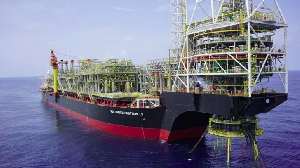…Royalties to Ghana Lowered in Favour of Kosmos-EO
…As GNPC Ready to Buy Kosmos Stake in Jubilee Field
While the Ghana National Petroleum Corporation (GNPC) toiled over the years in pursuit of a vision that others described as a mirage, their critics were quietly lining up to plunder ‘the spoils.’
As the controversy over how the E.O. Group a Ghanaian company, came by 3.5% carried interest in US-based Kosmos Energy’s initial 90% stake in the West Cape Three Points (WCTP) rages on, it has emerged that the Kufuor administration lowered the finishing tape for Kosmos Energy and EO Group at the expense of our beloved Ghana.
As part of its vision of ensuring that Ghana maximized its earnings from harnessing the country’s hydrocarbon potential, GNPC, since the 1980s, evolved a model petroleum agreement, which has served as a blue print for preparing petroleum agreements to license its blocks of oil fields to oil companies that came to explore for the ‘black gold’ in Ghana.
Whereas under previous petroleum agreements, royalties had been pegged between 10% - 12.5%, this was slashed to 5% under the Petroleum Agreement the Kufuor Government and GNPC signed with Kosmos Energy, and their E.O. partners. GNPC participation interest, a provision in petroleum agreements, which allows GNPC to acquire additional stake in the event of a commercial find, used to be 10%-15%, under previous petroleum agreements. However, this was also slashed down to 2.5%, under the petroleum agreement signed with Kosmos-E.O. Group, leaving it standing like a sore thumb, when matched against all other petroleum agreements, including those subsequently signed with other companies under the Kufuor regime.
Petroleum agreements signed with Lushann Eternit (Salpond Oil and Gas Field), dated July 30th 2004, Vanco Energy/Lukoil (Cape Three Points – Deep) on 19th August, 2002 existing at the time of signing the Kosmos agreement, had 15% as initial participation interest for GNPC.
However, when it came to the Kosmos Agreement, signed in 2004, this was scaled down to 10%.
All agreements subsequently signed (i.e. with Vitol Upstream, Hess Corporation, Gasop Oil, Oranto International, Afren plc/Mitsui Consortium, Aker ASA/Chemu Power, and Tullow Consortium for Tano Deep), had the GNPC participation as 10% except for Tullow Consortium for Tano Shallow, which was fixed at 12.5%. GNPC sources say the Kosmos –EO agreement was so bad that, it haunted the corporation throughout the subsequent agreements. The other companies asked us: “why will you give Kosmos-EO such favorable terms and increase it when it comes to us”
A due diligence investigation started by Anadarko before partnering Kosmos and EO Group in the West Cape Three Points block, sparked controversy by raising several shocking red flags on the conduct of Kosmos and the E.O. Group. Follow-up investigations by Ghana’s agencies, including the Attorney-General’s Department, have unearthed certain acts which include forgery of documents, in the registration of the E.O. Group, whom Kosmos carried along with 3.5% stake, in addition to paying them $250,000.00.
The E.O. Group is a partnership between Dr. Kwame Barwuah Edusei, former Ambassador to Switzerland and also the U.S., under the Kufuor administration, and Mr. George Yaw Owusu, who later became Kosmos Energy Country Representative.
…GNPC READY TO BUY KOSMOS STAKE
The Managing Director of the Ghana National Petroleum Corporation (GNPC) Nana Boakye Asafu-Adjaye, has said the corporation’s decision to acquire the Kosmos Energy stake in the Jubilee Field, is necessary and critical to ensuring that Ghanaians derived the maximum benefits from the country’s oil resources. According to the GNPC boss, the state oil corporation, has already secured the necessary funding to acquire the stakes, and were in discussions with Kosmos Energy, who voluntarily decided to sell their stakes.
He said it is only after GNPC has acquired the Kosmos stake that it will then decide how much of it to retain and how much to offload to a suitable partner or partners.
Responding to questions after a media interaction at the Coconut Grove Regency Hotel last Monday, February 8, 2010 Mr. Asafu-Adjaye disclosed that a Floating, Production, Storage and Offloading (FPSO) vessel, which will be used to store the oil produced at the oil fields is under construction in Singapore, and is 80% completed and would be due in Ghana sometime in June.
In a presentation, in which he took journalists through the different phases of Petroleum Exploration activities in Ghana, Mr. Asafu-Adjaye assured Ghanaians that there is a stable and sustainable appraisal process ongoing and that the timeline for the first crude oil production from the Jubilee Field was on schedule. First oil will flow in the last quarter of 2010, he emphasised. Mr. Asafu-Adjaye said GNPC will, in the next three years focus on “appraisal and development” of Tweneboa, Odum, Mahogany Deep, Sankofa and other discoveries to be made.”
According to him, GNPC was building capacity to ensure a sustainable pursuit of its mandate and revealed that the corporation has already re-established the crude oil marketing department and lifting crude oil from Nigeria. The GNPC boss narrated how the first conscious national effort at harnessing the hydrocarbon potential of the country led to the establishment of GNPC by PNDC Law 83 of 1983 and the subsequent enactment of the Petroleum (Exploration and Production) Law, PNDC Law 84 of 1984.
He said GNPC, subsequently assembled data scattered all over the world, as well as those in the custody of the Geological Survey Department (GSD), which was hitherto, the government agency that co-ordinated exploration activities in the country.
GNPC’s Director of Exploration and Production, Mr. Thomas Manu, assured Ghanaians that the country’s interest was secured, as far as production was concerned, because there are metres fixed to every well, which will read and transmit oil flows to GNPC. He took newsmen through the history of exploration activities, and the state of development, as far as the Jubilee Field was concerned, and also work done by GNPC that culminated in the commercial discovery of the field announced on June 18, 2007.
Mr. Manu disclosed that a Hunt Oil well, drilled in 1997 was the turning point for the beginning of deepwater exploration in Ghana, revealing that the foundation for the Jubilee Field discovery was laid in 2000, with a Composite Prospect Map, detailing the areas with the highest potential for oil.
GNPC’s Chief Economic Evaluation and Monitoring Officer, Mr. Kwame Ntow Amoah, disclosed that the supply chain in the oil and gas service industry is extremely efficient and therefore it would take some time for local capacity to be built. He said one reason that accounts for the current little local content in the Jubilee Field development is the fast track approach adopted by the partners to produce the first oil. He said it was necessary to build efficient management capacity to respond to the demands of the sector. He emphasized the need for GNPC to acquire the Kosmos Energy stake in Ghana’s oil fields and explained that apart from the 10% initial carried interest, GNPC has exercised its right of acquiring additional interests in the Jubilee field. He explained that apart from these, royalties and income tax earnings from the oil sale would leave the nation with over 50% of the profits from the oil.
GNPC: A GIANT IN THE PAST
In his opening remarks, the Chairman of the Board of Directors of GNPC, Mr. Ato Ahwoi, said
“The creation of a Ghanaian service industry requires that GNPC and other Ghanaian companies should own different kinds of onshore and offshore drilling rigs and related equipment.”
Mr. Ahwoi, who was Minister for Fuel and Power from the 1980s to the 1990s, spoke about GNPC’s developed capacity in the past:
“In the 1990s we owned drilling rigs including offshore drilling platforms (for which we now pay millions of dollars daily). We owned a small fleet of offshore supply boats, work boats and oil tankers. We owned our own fledgling helicopter service.”
He continued that “These were an important source of income to GNPC. If we had retained this capacity we would be earning revenue for Ghana even now before first oil. More importantly they allowed us to develop the managerial capacity to integrate all these different complex operations commercially and to conduct exploration independently of the international oil companies. In other words the pace at which we would realise national aspirations could no longer be dictated by foreign capital.”
With reference to scientific research and analysis that have been done by GNPC, including a world class laboratory on the Spintex road, the Board chairman said, “Today, we are confident that there is no one who understands our regional petroleum geology better than we do in GNPC.”
The Chairman said in spite of many criticisms that GNPC was simply a drain on national resources it stayed focused on its task. “That is why it is so sad for us today to hear people claiming exclusive credit for our growing success without acknowledging the years of dedicated scientific research and analysis that this is based on,” he lamented.
“It is not enough however to discover oil. There is no reason that Ghana’s scientists and their institutions – Geological Survey Department, the various earth science and geographical departments in our tertiary institutions, should not become a centre of exploration excellence for data acquisition in the region and for outsourced data processing and analysis serving at our region and beyond,” Mr. Ahwoi emphasised.
General News of Wednesday, 10 February 2010
Source: The Enquirer
EO -Kosmos Rip-Off Exposed
Opinions











